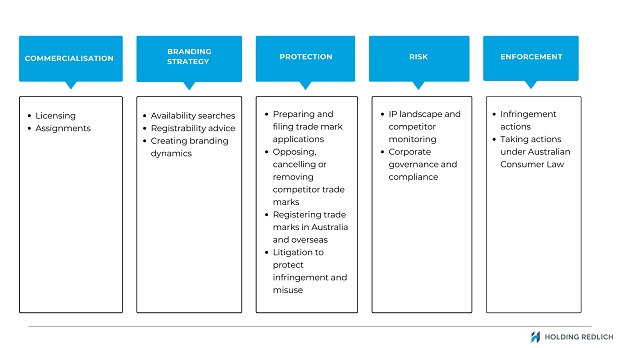- within Law Practice Management, Antitrust/Competition Law and Consumer Protection topic(s)
- with Senior Company Executives, HR and Finance and Tax Executives
- with readers working within the Property industries
The branding associated with a business is fundamental to establishing commercial goodwill and building reputation. Business names, symbols and logos – referred to in this article as trade marks – play a crucial role in a brand's identity and allow businesses to differentiate their products or services from those of competitors. If used properly, a trade mark can serve as an excellent marketing tool.
Businesses often employ a 'set and forget' approach by, for instance, registering several key trade marks and then taking no further action. Trade mark management is an ongoing process and it is important that businesses have systems in place to help monitor, revise and renew trade marks as required.
Some of the key trade mark decisions of the Federal Court of Australia in 2023 have shown that failing to stay on top of and conduct regular 'health checks' of a business' trade mark portfolio and brand protection strategy can have significant adverse consequences.
To get a sense of the 'health' of a business' brand and trade marks, some of the questions that should be asked include:
- who is using the business' registered trade marks? Are they being used by the registered owner of the trade marks? If not, are there proper arrangements in place to ensure that the registered owner is maintaining control over any third party use of the trade marks? If the trade mark owner does not maintain sufficient control over its use, the trade mark registration may be vulnerable to removal from the Register. We explored this in our previous article here.
- when was an audit of the business' unregistered trade marks last conducted? Are all trade marks which are in use currently registered? Have any of the trade marks being used by the business changed in recent years? Are there any gaps in the business' portfolio of registered trade marks?
- when was an audit of the business' registered trade marks last conducted? Are the business' trade marks being used and, if so, are they used properly to perform a branding function? Are the registered trade marks being used in relation to the goods and services in respect of which they are registered? If the answer to any of these questions is 'no', the trade marks may be vulnerable to removal from the Register for non-use.
- does the business' trade mark contain any environmental elements or credentials? If so, are the environmental components of the trade marks in any way misleading or deceptive? See our earlier discussion here.
Holding Redlich's expert team
Holding Redlich has a team of legal experts with deep expertise in safeguarding clients' valuable brand identity through comprehensive trade mark solutions.
We manage worldwide portfolios for many significant brands and we deliver protection in connection with all aspects of trade mark and brand protection services, as set out in further detail below.

This publication does not deal with every important topic or change in law and is not intended to be relied upon as a substitute for legal or other advice that may be relevant to the reader's specific circumstances. If you have found this publication of interest and would like to know more or wish to obtain legal advice relevant to your circumstances please contact one of the named individuals listed.
[View Source]

